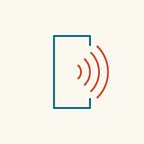Introducing Spoken — Predictive Speech App
First Place Winner at Start-Up Chile Demo Day, 2015
Last year, my grandmother suffered a stroke. She woke up in a hospital bed, her mind intact but completely unable to speak. When the nurses came, they handed her what they’ve been giving patients for the last fifty years: a sheet with pictures she could point at for food, toilet, pain. She was the same woman she’d been that morning — educated, and opinionated — but now her entire world had collapsed down to a few words on a piece of paper.
While we sat in the waiting room, everyone agreed the next step was clear — she loved her iPad, so we just needed an app to help her communicate. What we found was terrible: Amateur efforts with unusable interfaces — Non-English options were even worse. Instead of taking advantage of new technology, they were simply digital versions of that same sheet of paper.
As treatment improves worldwide, we’re creating millions of stroke survivors like my grandmother every year. And that’s only a small part of the larger market — autism, deafness, ALS.. Nearly one in 10 people will need help communicating in their lifetime, and they’ll be looking to their mobile devices for help.
You see, speech disorders give you a “tip of the tongue” feeling, like a severe stutter. The next word is in your head, it’s obvious, but you just can’t get it out.
We came to Chile with an idea — that you could predict that next word, by taking the algorithms that power your phone’s autocomplete, and applying them to much, much bigger data. Even better, our system could listen to conversations and know what was happening, giving suggestions that fit the context and improved with time. This radically different approach could be applied to nearly any language in the world.
Well, I’m excited to tell you today that it worked. We built that system, we put it in front of users, and they love it. They went from “food” and “toilet” to real sentences with full vocabularies, about feelings, hopes and memories. They love that it remembers names and learns from how they talk.
We were aiming to beat those other apps, but what surprised us that it outperformed systems costing thousands of dollars. Intel spent two years building a custom prediction engine for Stephen Hawking, they just released the specs.. You can do the comparison — ours is better, and it runs on your iPad!
It’s all thanks to a team that blends academic knowledge with real experience. Matt’s brought natural language processing to some of the biggest sites in the world, and Sophia’s built a career doing linguistic research for the Fortune 500. I’ve spent nearly a decade working in marketing and design, and have launched apps for three different startups in the past year alone — but nothing has me more excited than the progress we’ve made in the last few months.
We’ve created a business with all of the advantages of a health care startup — fulfilling the most essential need of a growing market — but none of the downsides. There’s no government approval or medical bureaucracy to get in the way. Here, right now, we’re at the start of something huge: actually treating disability with software.
It’s a breakthrough product that not only helps people, but has a clear path to market. And millions worldwide, just like my family, are waiting for that next step — waiting to hear someone they love speak again.
Let’s make that happen.
We’re currently looking for beta testers, as well as rasing our first round of financing. If you’d like to get involved, please drop me a line at Bond@SpokenAAC.com.
